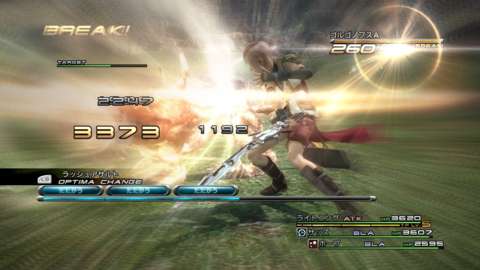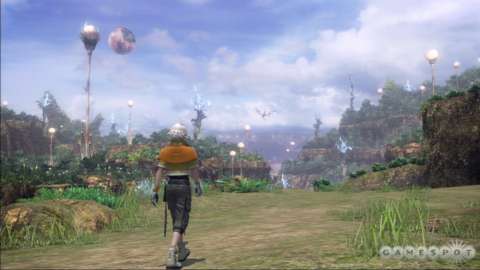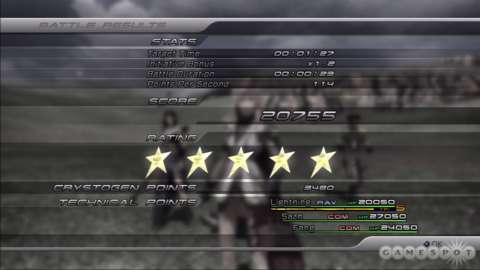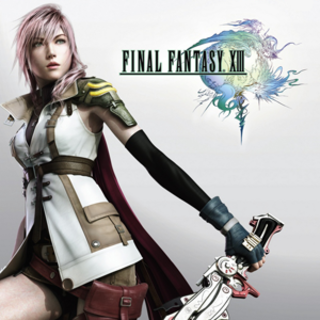
Final Fantasy XIII is a console role-playing game developed and produce by the infamous company Square Enix in March of 2010 following Japan's release in December of 2009. As the thirteenth installment to the long-standing Final Fantasy franchise, a lot of expectations were placed hoping that it would revolutionize the series. However, after its release, the game was forced to suffer the bane of extreme skepticism from critics and hardcore fans everywhere. While the game was praised for it's production values, it was heavily criticized by most for it's linear nature for the majority of the game. After talking in person with fans of the original games, the complaint that they had was that the game was unlike anything they've ever experienced in a game before, but not in a positive way. They continued on saying that the game's linear nature and questionable design choices made it a title that not only felt alienating to them as long-term fans, but also felt uncomfortable playing the game. From my point of view, the negativity the fans had for the game was completely justified, because no matter what changes you make to a game as synonymous as Final Fantasy to please new and old fans, you will only please a certain percentage of people. Since this was my first official RPG (taking into account that I've played a lot of RPG-hybrids), I went into this game with the mindset that this game was not as bad as most labeled it as and I can say that I was mildly surprised. This game was not only more enjoyable than I anticipated, but it was also one of the first game that have annoyed me to a new level. With that beefy intro finished, join me as I dwell into the world of Final Fantasy for the first time...
Story:
The story takes place in the world of Gran Pulse, a world overseen by a group of transcendent leaders known as fal'Cie. Above this world lies Cocoon, a floating city observed and ruled by the theocratic government, the Sanctum. In the beginning, you play as the heroine Lightning as she combats troops from Gran Pulse on a train in which the passengers are on their way to get "purged." Shortly after, she encounters a pilot by the name of Sazh, and the two of them escape their train in an attempt to save Serah, Lightning's sister. As the game progresses, four other characters: Hope, Vanille, Snow, and Fang will encounter one another by fate as they find themselves branded l'Cie, servants of the fal'Cie, as they attempt to discover and fulfill their focus. The narrative in the game is mostly presented in the form of flashbacks as you discover what each character has done up to the point where they all have met. Composed of thirteen chapters, the game remains incredibly straightforward for most of your journey, until Chapter 11 when you are given plenty of room to breath, and are given the opportunity to complete Cie'th stone missions, sidequests that are mostly hunt and kill quests. When a Cie'th (a l'Cie that fails to complete their focus) loses their will to live, they are transformed into stone and cease to exist. In a shot of redeeming them, you are given the opportunity to complete their focus and obtain rare and useful items. Being that I was completely new to the series, I was thoroughly entertained by the story at hand and the interaction between the characters. As the game progressed, I marveled at how character relationships were either strengthened, compromised, or resolved as tension, regret, and bonding occurs between them as they try to cope with the massive task that they are presented with. The story was well-paced for the most part and does an excellent job at exploring the inner struggles each character has to deal with.

Gameplay:
While the story was pretty well-executed, the gameplay portion is where the criticism mostly resides. From what I've experienced, most of the criticism was understandable. While I can safely say that XIII's linear nature limits what you are capable of doing, there is plenty of enjoyment to be derived from it, assuming you know where to look. Starting with the combat system, XIII's claim to fame is the obscure Paradigm system, a mechanic in which you can switch the "roles" of every character in your party to prepare for dynamic situations. Final Fantasy XIII uses an Active Time Battle system that appears to be real-time strategy. For combat, you control only one party member, and the other two are controlled by the AI. You have two separate meters to perform various actions: the ATB meter is where you spend ATB segments to perform basic attacks, spells, use items, and use the Auto-battle command, a feature in which the CPU determines the best course of action according to the current situation and chooses commands for your character to perform. Most gamers claim that this mechanic makes the game too easy, and to be relatively straight-forward, this is not the case. The auto battle command does not make the game a cakewalk, because not only are the actions you need in certain situations never guaranteed, but most enemies are easily capable of demolishing your party for your poor execution. The second meter is your technique gauge in which you use to perform alternate techniques, such as reviving downed allies, using powerful techniques, or calling forth the power of your Eidolon. Perhaps the most visually pleasing feature of the game is the summons, in which each character is capable of using their Eidolon and have to perform certain actions to raise your ATB gauge in order to use Gestalt Mode, when your Eidolon changes into its alternate form. In this mode, it plays more of an action mini-game in which you choose moves to perform that have a certain value of points required to use. Each character's Gestalt Mode has different uses, so there is bound to be a favorite for most people! The combat is easily the best part of the game as the game is hell-bent on keeping you on your guard as battles can change as easily as they can be won. However, it is far from perfect. For starters, the Paradigm system removes the possibility of micromanaging your party, as the CPU handles most of the work for you. Outside of battle, you are mostly restricted to only moving forward, but you will be allowed to explore much later in the game. Save points serve as a way to save your progress, upgrade your equipment using component salvaged from battles and bought, and shop for items. The shop system is story-dependent as you are limited to the shops you can buy from depending on your story progression. Leveling up is done via the Crystarium tree, in which you exchange Crystogen points from victorious battles and selling items to level up your assigned roles. Your characters start out with only three, but you will be able to learn all roles with enough invested time. However, progression is linear as well, as most of the node of the Crystarium grid are small stat boosts, and there's no room for flexibility and specialization as you will be able to buy all the upgrades with enough Crystogen points, but that will not be easy, a fair warning. This new approach to the game doesn't add anything necessary, and I felt that it ruins the fun of exploring towns and visiting their shops. This game has a lot to do for your money's worth, and despite it being limited until you progress further in the game, it is never redundant to the point where you consider it pointless.

Presentation:
There's not much to say here other than it's fantastic! The game's visual aesthetic takes my standard of graphics for video games to another level as I was insanely stunned at how beautiful the game really is. The lush and extremely varied landscaped were visually striking enough for me to stop what I'm doing just to take in the breathtaking atmosphere. The character models, CGI cutscenes, enemy designs, and particle effects are all just extremely well-done. The musical score for the game is pretty good for my tastes, but I did question only one why it sounded a little western for a console RPG from Japan. Regardless, I enjoyed the soundtrack for what it is, and does its job at establishing the appropriate moods throughout various times in the game. I applaud Square Enix for the amazing job they have done crafting a game that was as fantastic to look at as it was fun as hell to play!

Overall:
Final Fantasy XIII is indeed a solid RPG experience, regardless of any negative feedback that you get from anyone. As I was playing the game, I began to notice that this game was definitely geared towards bringing in new fans from the west into the world of Final Fantasy. It is plainly obvious that the game is nowhere close to perfect and certainly is not for everyone, but it is still an enjoyable game nonetheless. Questionable design choices, limited potential due to linearity, and an emphasis on expanding its fanbase, Final Fantasy XIII attempts to please everyone, but ultimately fails to do so. Coming from a gamer who has never played a Final Fantasy game before, I was pleasantly surprised to find a solid RPG that managed to keep me invested for well over 25 hours. Considering that you can find the game nowadays under $20, I'd say that it is indeed well worth your money as it has aged extremely well. It may not be the mind-blowing Final Fantasy game that Square Enix was clearly aiming for, but despite it's hardships, it manages to remain an experience that only those who are truly willing to play it will fully enjoy.


